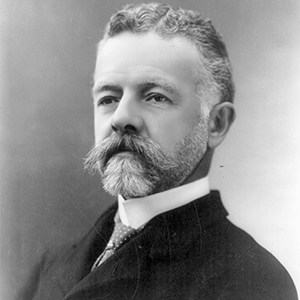Henry Cabot Lodge represented Massachusetts in the U.S. Senate for three decades. During his long tenure in Congress, Lodge was a close friend of President Theodore Roosevelt and a political nemesis of President Woodrow Wilson.
Early Life
Lodge was born into a wealthy Massachusetts family. He graduated from Harvard University, Harvard Law School, and then earned his Ph.D. in history from the school. He was first elected to the U.S. House of Representatives in 1887. In 1893, he won a seat in the U.S. Senate, a position he would hold until 1924. Lodge has the distinction as serving as the first Senate Majority Leader, although he was not officially bestowed the title.
Career in Senate
During his Senate career, Lodge frequently aligned himself with fellow Republican and friend Theodore Roosevelt. He was a proponent of civil service reform, continuing the gold standard, restricting immigration, and expanding the Navy.
When Woodrow Wilson unseated Roosevelt, Lodge was a vocal critic of the new administration. He once wrote to Teddy Roosevelt, “I never expected to hate anyone in politics with the hatred I feel toward Wilson.” Lodge was particularly critical of Wilson’s foreign policies. He argued in favor of the United States entering World War I and later opposed Wilson’s Fourteen Point Plan for achieving peace. Lodge believed that Germany should be harshly punished for its conduct and accused Wilson of being soft.
Senate Foreign Relations Commitee
As chairman of the Senate Foreign Relations Committee, Lodge successfully defeated the entry of the United States into the League of Nations, arguing that the United States should avoid unnecessary involvement in international politics. “The United States is the world’s best hope,” Lodge stated in a speech outlining his objections, “but… if you tangle her in the intrigues of Europe, you will destroy her powerful good, and endanger her very existence…
Lodge also led the charge to prevent ratification of the Treaty of Versailles. He specifically objected to a provision that would require the United State to come the aid of any member country without the need for congressional approval. Lodge argued that Congress should have the final say regarding whether to deploy American troops on a combat or a peacekeeping mission. The U.S. never signed the treaty, although it did reach a separate peace treaty with Germany.








